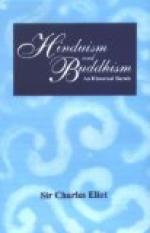This struck me forcibly when visiting Siam some years ago. In Bangkok there is a large Chinese population and several Buddhist temples have been made over to them. The temples frequented by Siamese are not unlike catholic churches in Europe: the decoration is roughly similar, the standard of decorum much the same. The visitors come to worship, meditate or hear sermons. But in the temples used by the Chinese, a lower standard is painfully obvious and the atmosphere is different. Visitors are there in plenty, but their object is to “get luck,” and the business of religion has become transformed into divination and spiritual gambling. The worshipper, on entering, goes to a counter where he buys tapers and incense-sticks, together with some implements of superstition such as rods or inscribed cards. After burning incense he draws a card or throws the rods up into the air and takes an augury from the result. Though the contrast presented in Siam makes the degradation more glaring, yet these temples in Bangkok are not worse than many which I have seen in China. I gladly set on the other side of the account some beautiful and reverent halls of worship in the larger monasteries, but I fear that the ordinary Chinese temple, whether Taoist or Buddhist, is a ghostly shop where, in return for ceremonies which involve neither moral nor intellectual effort, the customer is promised good luck, offspring, and other material blessings.
It can hardly be denied that the populace in China are grossly superstitious. Superstition is a common failing and were statistics available to show the number and status of Europeans who believe in fortune-telling and luck, the result might be startling. But in most civilized countries such things are furtive and apologetic. In China the strangest forms of magic and divination enjoy public esteem. The ideas which underlie popular practice and ritual are worthy of African savages: there has been a monstrous advance in systematization, yet the ethics and intellect of China, brilliant as are their achievements, have not leavened the lump. The average Chinese, though an excellent citizen, full of common sense and shrewd in business, is in religious matters a victim of fatuous superstition and completely divorced from the moral and intellectual standards which he otherwise employs.
Conspicuous among these superstitions is Feng Shui or Geomancy,[570] a pseudo-science which is treated as seriously as law or surveying. It is based on the idea that localities have a sort of spiritual climate which brings prosperity or the reverse and depends on the influences of stars and nature spirits, such as the azure dragon and white tiger. But since these agencies find expression in the contours of a locality, they can be affected if its features are modified by artificial means, for instance, the construction of walls and towers. Buddhism did not disdain to patronize these notions. The principal hall of a monastery is usually erected on a specially




